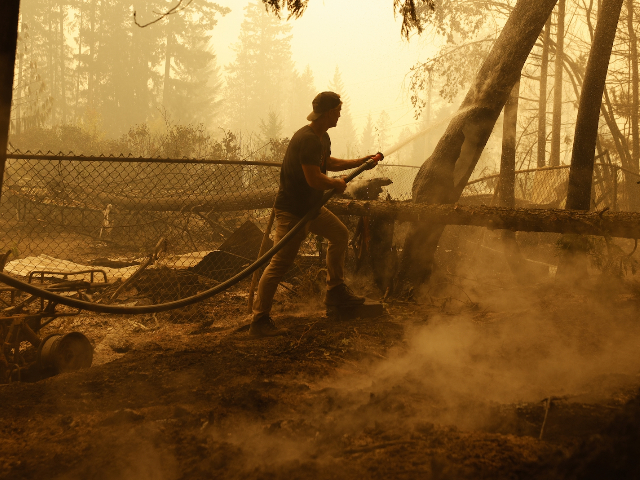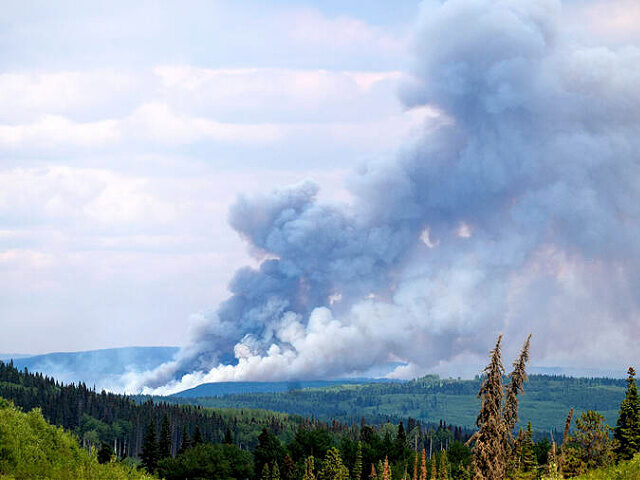Canadian officials are reportedly monitoring “zombie” wildfires continuing to rage under the snow in late January, the National Post reported on Monday, which threaten to erupt with force in the spring and could potentially lead to another record-breaking year of fires.
As of January 1, the National Post documented Monday, the province of Alberta has documented 51 active wildfires, while British Columbia is monitoring 91 active fires.
Many of these are believed to have been burning for months and formed part of the 2023 wildfire year, an international disaster that ravaged Canadian communities across the continent, displacing thousands who were forced to drive away from the fires as their cars melted.
The fires also affected over 100 million Americans in 23 states in the form of dangerous air pollution wafting across the Canadian border all the way down to Florida.
Paul Dousset via Storyful
“By late June, Canada had broken its previous annual record for acreage burned, set in 1995, and by mid-October nearly forty-six million acres—an area larger than Denmark—had been charred,” the New Yorker observed on Monday. “This was almost triple the previous record and nine times the annual average.”
The fires burning currently survive thanks to flammable peat moss and dry weather conditions. Such “zombie” fires have long survived Canadian winters but, experts say, the number appears higher than in usual years.
“Forrest Tower of the BC Wildfire Service said that while it’s not uncommon for some fires to burn through the winter, that number usually hovers around a couple dozen, not the 106 that were listed as active on New Year’s Day,” the National Post shared.
Radical leftist Prime Minister of Canada Justin Trudeau blamed the fires on “climate change” during the summer catastrophe. Asked if this was accurate, University of British Columbia expert Lori Daniels told the left-wing station NPR, “this is a combination of factors.”
Daniels called for “transformative” changes in how Canada approaches fires, including “proactive forest management, proactive fire management – that allows our ecosystems to function and be more resilient as climate changes and these wildfires continue to burn.”
The Trudeau administration emphasized the alleged role that “climate change” played in the fires and encouraged residents to “adapt to living with fire,” rather than acting decisively. Trudeau received little international criticism for the prodigious carbon footprint of the fire disaster – or for the Canadian government’s failure to adequately respond to the situation. Contrary to calls for “proactive forest management,” Canada has long eschewed the active removal of flammable underbrush and the use of controlled fires to prevent larger disasters, despite a lengthy history of Native Americans on the continent using controlled fires to “foster the growth of useful plants, to clear space for farming, and to improve the conditions for hunting,” as the New Yorker detailed this week.

File/A resident sprays water on hot spots near a house during a wildfire in Celista, British Columbia, Canada, on Saturday, Aug. 19, 2023. (Cole Burston/Bloomberg via Getty)
“Research on forests in British Columbia shows that in centuries past, small- to moderate-size fires were common every several decades. Underbrush and deadfall on the forest floor would burn away, but many trees would survive,” the editorial board of the Globe and Mail explained in 2021, condemning the country for “decades of bad decisions” on wildfires.
“Canada has failed to fund the proactive management of forest fires sufficiently and is not poised to do better moving forward,” Canadian think-tank Fraser Institute senior fellow Kenneth P. Green wrote in the summer. Green conceded to Trudeau that “the climate is indeed warming” but “despite the increasing occurrence of wildfire disasters in Canada, funding to support wildfire prevention, mitigation and preparedness have not kept pace with the increasing need to mitigate the impacts from wildfires.”
The Canadian government has no national fire service, no federal forest management service, and no Federal Emergency Management Agency (FEMA)-style emergency system, leaving it few large-scale options to respond to the fires. Provincial responses to the fires failed in some areas due to decisions such as Quebec refusing to allow Montreal firefighters to participate in the wildfire responses, waiting for firefighters to fly in from France and Chile, among other countries. In some parts of Canada, such as British Columbia, civilians began stealing hoses and firefighting gear from the government and attempting to stop the fires themselves; officials confirmed the thefts appeared to be good-faith efforts, though they discouraged the practice.
In Canada, forest firefighters receive fewer benefits and lack training on chemical toxins, union leader Noah Freedman told the CBC on Monday. Freedman is the vice president of Local 703 of the Ontario Public Service Employees Union (OPSEU) and works with the Ministry of Natural Resources and Forestry (MNR), according to the CBC.
“I’m astounded and reminded that our employer doesn’t provide any training whatsoever on hazards associated with exposure to forest fire smoke,” he lamented. “We need to be reclassified, and it’s truly shocking the amount of pushback we’ve had on this from the Ontario government … “We’re not entitled to any occupational benefits, and really, they’re not benefits — they’re a matter of human rights.”

COMMENTS
Please let us know if you're having issues with commenting.